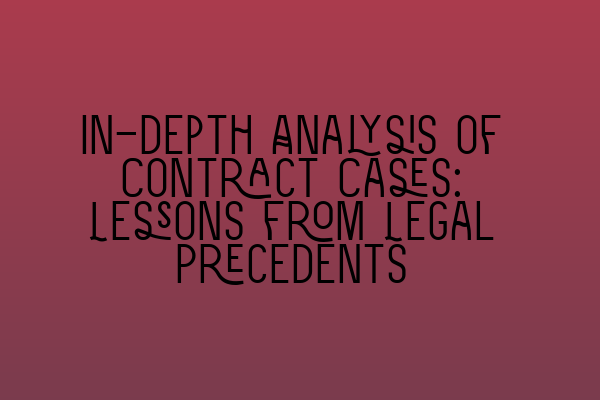In-depth Analysis of Contract Cases: Lessons from Legal Precedents
Welcome to our blog post on contract law. In this article, we will delve into the world of contract cases, examining legal precedents and extracting valuable lessons for both solicitors and aspiring lawyers. Whether you are studying for the SQE 1 or SQE 2 exams, or simply looking to deepen your understanding of contract law, this in-depth analysis will provide you with the knowledge you need to excel.
Before we begin, make sure to check out our SQE 1 Practice Exam Questions and SQE 1 Practice Mocks FLK1 FLK2 for comprehensive study resources. If you need assistance with exam preparation, our SQE 2 Preparation Courses and SQE 1 Preparation Courses are designed to help you succeed.
Understanding Legal Precedents
Legal precedents play a crucial role in contract law. They provide guidance and establish a framework for interpreting and applying contractual principles. By analyzing contract cases and their accompanying precedents, solicitors can better navigate complex legal issues and craft effective legal strategies.
One notable contract case that exemplifies the importance of legal precedents is Carlill v. Carbolic Smoke Ball Co. This landmark case dealt with an advertisement promising a reward for anyone who contracted influenza after using a particular product. The court held that the advertisement formed a unilateral contract, and the company was bound by its offer. This case set a precedent for the formation of unilateral contracts and the importance of clear and specific terms.
Identifying Key Contract Principles
Contract cases often highlight important principles that shape the interpretation and application of contract law. By studying these cases, solicitors can gain valuable insights into the elements that make a contract enforceable and the rights and obligations of the parties involved.
One such principle is the concept of consideration. Consideration refers to something of value exchanged between parties to a contract. In the case of Currie v. Misa, the court defined consideration as a “right, interest, profit, or benefit accruing to one party, or some forbearance, detriment, loss or responsibility given, suffered or undertaken by the other.” This principle serves as a foundation for determining whether a contract is valid and enforceable.
Applying Lessons from Legal Precedents
By examining contract cases and the precedents they set, solicitors can apply the lessons learned to current and future legal matters. Understanding how courts have interpreted and applied contract principles in the past allows solicitors to make more informed decisions and provide robust legal advice.
For example, the case of Balfour v. Balfour established the concept of domestic agreements not giving rise to legally binding contracts. This precedent highlights the importance of intention to create legal relations in contract formation. Solicitors can use this knowledge to advise clients on the necessity of formalizing certain agreements to ensure enforceability.
Conclusion
In conclusion, the analysis of contract cases and legal precedents is an invaluable tool for solicitors and aspiring lawyers alike. By studying contract cases, identifying key principles, and applying lessons learned, legal professionals can navigate the complexities of contract law with confidence. Remember to check out our SRA SQE Exam Dates and stay up to date with the latest information on the SQE exams.
For more comprehensive practice materials, take advantage of our SQE 1 Practice Exam Questions and SQE 1 Practice Mocks FLK1 FLK2. If you need assistance with exam preparation, our SQE 2 Preparation Courses and SQE 1 Preparation Courses are here to support you.
